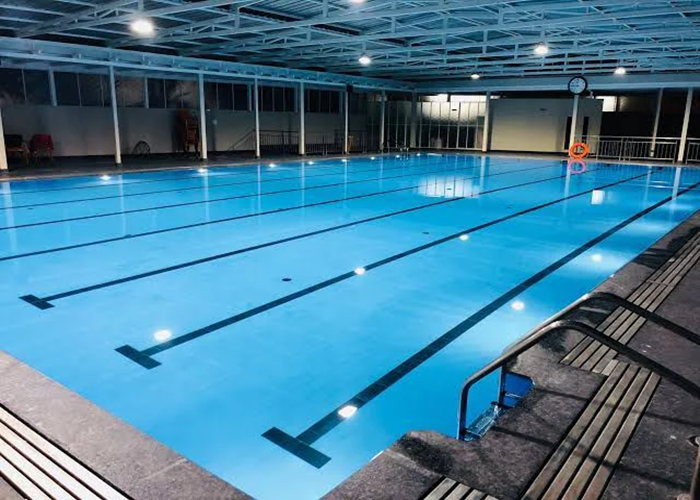Swimming Pool Industries in India Using STP, ETP, WTP, WWTP, and RO Systems for Efficient Water Management

India's swimming pool industry has expanded rapidly in recent years due to increased demand from residential societies, hospitality, sports complexes, and wellness centers. This growth is evident in urban regions and tourist-heavy states like Maharashtra. The rising awareness of fitness and recreation and architectural trends have made pools a standard in luxury amenities.
In Maharashtra, cities like Mumbai, Pune, and Nashik have seen a rise in public and private swimming pool installations. These projects range from rooftop pools in hotels to Olympic-sized pools in sports academies. With this expansion comes the responsibility of managing vast volumes of water sustainably, making treatment systems a critical part of pool infrastructure.
Water Is Essential for Pool Filling, Circulation, Filtration, and Maintenance in Swimming Pools
Swimming pools require large volumes of water, initially during filling and continuously for daily operation. The water must be maintained at hygienic levels, which involves regular filtration, chlorination, and circulation. Any evaporation losses or water discharged during backwashing also need replenishment.
In addition to recreational use, pool water is used in surrounding areas like spas, saunas, and water features. Since pool water interacts with skin, hair, and potential contaminants, it demands precise quality control. High-quality treatment systems ensure the water remains safe, clean, and visually clear.
Backwashing, Overflow, and Cleaning Generate Substantial Wastewater in Swimming Pool Operations
While primarily water users, swimming pools generate significant amounts of wastewater through daily maintenance and operation. Backwashing the filtration system flushes out debris and contaminants, producing chemically treated wastewater. This process is usually performed every few days to maintain filter efficiency.
"Clean water is the soul of every swimming pool. Managing its purity and responsibly treating wastewater isn’t just a technical need—it’s a commitment to health, hygiene, and sustainability."
Other sources include overflow from rainfall or splashing, regular cleaning of pool floors and walls, and draining during water replacement cycles. This wastewater contains residual chlorine, dirt, oils, and other contaminants, which must be treated before being released or reused.
Wastewater Includes Backwash Water, Overflow, and Chemically Contaminated Cleaning Waste
Swimming pools produce several types of wastewater, most carrying residual disinfectants and physical impurities. Backwash water from sand or cartridge filters contains acceptable debris, bacteria, and chemicals like chlorine and algaecides. This water can't be directly discharged into drains or reused without proper treatment.
Overflow water from usage and rain often carries dirt, body oils, and personal care products, altering water chemistry. Additionally, periodic deep cleaning of pool interiors involves detergents and acids that require careful handling. While not industrial in scale, such wastewaters pose environmental risks if left untreated.
Pool Wastewater Is Treated Using Filtration, Neutralization, and Disinfection Before Reuse or Discharge
Swimming pool wastewater treatment typically begins with filtration to remove suspended solids. Backwash water is collected and passed through sedimentation tanks or filtration systems to separate solids from liquids. Chemical neutralization is then applied to reduce chlorine and pH to safe levels.
In some facilities, biological treatment or activated carbon filters are used for further purification. Finally, the treated water may be disinfected and reused for gardening, floor cleaning, or even as makeup water for the pool, depending on its final quality. This cycle significantly reduces freshwater demand and operational costs.
Advanced Filtration, Ozonation, and Recirculation Systems Enable Efficient Reuse in Swimming Pools
Modern swimming pool facilities are using advanced water treatment technologies to reduce waste. Systems like ozone disinfection, UV treatment, and automated dosing help maintain water quality while minimizing chemical usage. Backwash recovery units are now being used to reclaim and reuse water from filters.
Some high-end pools have sensor-based monitoring that adjusts real-time filtration and chemical dosing, reducing wastage. These innovations cut down on water consumption and make pool operations more cost-efficient and environmentally responsible, aligning with green building standards and sustainability goals.
Tailored Water Treatment Solutions for Pools: Design, Installation, Operation, and Maintenance by Experts
We offer end-to-end water treatment solutions for swimming pool projects, from small residential pools to large commercial setups. Our services include designing and installing Water Treatment Plants (WTP), Effluent Treatment Plants (ETP), and backwash recovery systems specific to your pool's scale and usage.
Our expert team ensures proper integration of filtration systems, dosing units, and wastewater management solutions that comply with local water safety regulations. We also provide AMC services, real-time monitoring systems, and upgrades to help you meet evolving water management needs while keeping operations cost-effective and eco-friendly.
Conclusion: Sustainable Water Management in Swimming Pool Industries

Sustainable Water Management in Hospitals Ensures Safety, Compliance, and Environmental Stewardship
Swimming pools, while synonymous with leisure, are also major water consumers. Effective management of this resource—through advanced treatment and recycling—ensures that pool operations remain sustainable and compliant with environmental norms. With technologies like WTP, ETP, RO, and backwash recovery systems, pools can significantly reduce water waste and operational costs. Our expertise in customized water treatment solutions helps the swimming pool industry thrive responsibly, delivering clean, safe, and cost-efficient water experiences.

